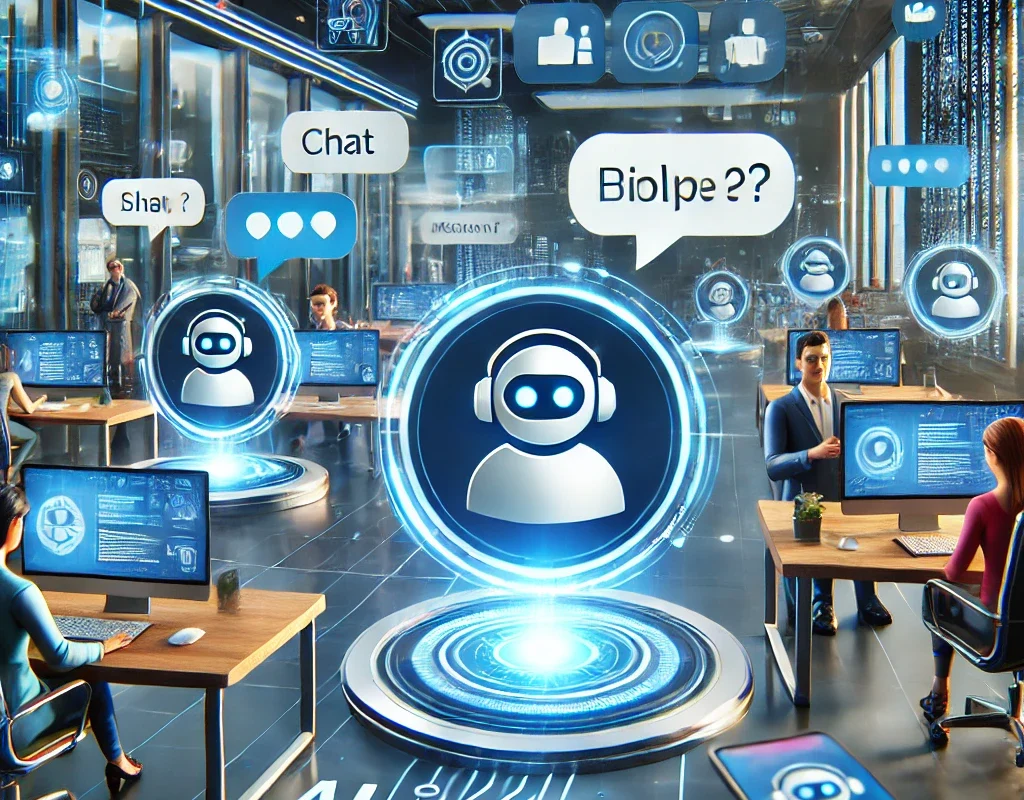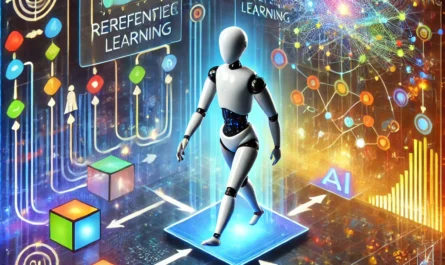In today’s fast-paced digital world, businesses face constant pressure to provide exceptional customer service while staying efficient. AI-powered chatbots have revolutionized customer service, enabling companies to streamline processes, improve response times, and deliver personalized experiences. These intelligent tools go beyond simple automated responses—they’re transforming how brands interact with customers, offering 24/7 service, scalability, and the ability to handle a multitude of inquiries. This article explores how AI chatbots can enhance customer service, examining their benefits, implementation strategies, and future potential.
AI Chatbots in Customer Service
The use of AI in customer service has grown exponentially in recent years. AI chatbots, which leverage natural language processing (NLP) and machine learning, can handle routine customer inquiries, freeing up human agents for more complex tasks. By using AI chatbots, businesses not only improve operational efficiency but also create more satisfying customer interactions.
The Importance of AI in Modern Customer Service
Customer service has always been a key differentiator for businesses. However, traditional methods—relying heavily on human agents—are often inefficient, costly, and prone to human error. Enter AI chatbots, which can handle multiple customer queries simultaneously, offering quick, consistent, and accurate responses. These chatbots can also learn from interactions, continuously improving their ability to assist customers.
By using AI-powered chatbots, companies can offer:
- 24/7 availability: Customers can get assistance anytime, reducing frustration and wait times.
- Personalization: AI can analyze previous interactions and customer data to offer tailored solutions.
- Cost savings: Chatbots can reduce the need for large customer service teams, decreasing operational costs.
- Scalability: AI chatbots can handle thousands of inquiries at once, making them ideal for businesses experiencing rapid growth.
Key Features of AI Chatbots in Customer Service
AI chatbots come equipped with a wide range of features that make them indispensable for customer service:
- Natural Language Processing (NLP): This enables chatbots to understand and respond to human language in a way that feels conversational, making interactions more natural and effective.
- Omni-channel Integration: AI chatbots can be integrated across various platforms such as social media, email, websites, and messaging apps, providing a seamless experience across all channels.
- Self-learning Capabilities: Through machine learning, chatbots can learn from previous interactions, continually improving their performance and accuracy.
- Analytics and Reporting: Chatbots gather valuable data on customer interactions, which can be used to gain insights into customer behavior, preferences, and pain points.
Benefits of Using AI Chatbots for Customer Service
AI chatbots offer numerous benefits for both businesses and their customers. Below are some of the most notable advantages:
Increased Efficiency
AI chatbots handle multiple inquiries simultaneously, significantly increasing the efficiency of customer service departments. This reduces wait times and ensures customers receive prompt responses, even during peak hours.
Reduced Costs
By automating routine tasks, businesses can cut down on the number of human agents required to manage customer service operations. This leads to reduced labor costs without sacrificing service quality.
Improved Customer Experience
With the ability to provide instant responses and 24/7 support, AI chatbots enhance the overall customer experience. They can offer personalized recommendations based on customer history and preferences, creating a more engaging and satisfying interaction.
Scalability
AI chatbots are particularly useful for businesses that experience fluctuating demand. Whether you’re handling a seasonal surge or rapid business growth, chatbots can scale up easily without requiring additional resources.
Consistency and Accuracy
Humans are prone to errors, but AI chatbots ensure that every interaction is consistent and accurate. They don’t forget details and can provide precise information based on the customer’s previous inquiries.
How to Implement AI Chatbots in Customer Service
Implementing AI chatbots in your customer service strategy requires careful planning and execution. Here’s a step-by-step guide to help you get started:
Identify Customer Service Pain Points
Before implementing chatbots, it’s crucial to identify the areas in your customer service process that need improvement. Analyze common customer complaints, response times, and areas where human agents are overwhelmed.
Choose the Right AI Chatbot Platform
There are various chatbot platforms available, each with different capabilities. When choosing a platform, consider factors such as integration capabilities, scalability, ease of use, and the level of AI sophistication required for your business.
Train Your AI Chatbot
Once you’ve chosen a platform, train your chatbot using real customer interactions. This will help the bot understand customer queries, respond appropriately, and improve over time.
Test and Optimize
Like any technology, AI chatbots require regular testing and optimization. Monitor how well the chatbot handles different queries and gather feedback from customers to make necessary adjustments.
Integrate with Existing Systems
To maximize the effectiveness of your AI chatbot, integrate it with your existing customer service tools, such as CRM systems, knowledge bases, and ticketing platforms. This will enable the chatbot to access relevant customer data and provide more personalized responses.
Challenges in Using AI Chatbots for Customer Service
Despite their many benefits, AI chatbots are not without challenges. Businesses must be aware of these potential hurdles to make the most of their chatbot implementation:
Understanding Complex Queries
While AI chatbots have come a long way, they can still struggle to understand complex or ambiguous queries. To mitigate this, it’s essential to program your chatbot with clear instructions on how to handle such situations, such as redirecting the customer to a human agent when necessary.
Maintaining Human Touch
Although chatbots can handle many customer inquiries, there are times when human interaction is irreplaceable. Customers may feel frustrated if they can’t speak to a human when they need more personalized assistance. It’s crucial to strike a balance between automation and human touch.
Data Privacy Concerns
AI chatbots collect and process large amounts of customer data, raising concerns about privacy and security. Businesses must ensure that their chatbots comply with data protection regulations, such as GDPR, and implement robust security measures to safeguard customer information.
The Future of AI Chatbots in Customer Service
The future of AI chatbots in customer service looks incredibly promising. As AI technology continues to evolve, chatbots will become even more sophisticated, offering increasingly human-like interactions. We can expect chatbots to play an even bigger role in customer service, with advancements in areas such as:
- Emotional Intelligence: Future AI chatbots may be able to recognize and respond to human emotions, offering more empathetic and tailored responses.
- Voice-activated Chatbots: As voice recognition technology improves, chatbots that understand and respond to voice commands will become more common, offering a hands-free customer service experience.
- Proactive Customer Support: Rather than waiting for customers to reach out with issues, AI chatbots will be able to anticipate problems and offer solutions before they arise.
AI Chatbots: A Game-Changer for Customer Service
The introduction of AI chatbots has transformed the way businesses interact with their customers. By providing instant, accurate, and scalable support, chatbots have become an indispensable tool for modern customer service departments. While challenges such as maintaining a human touch and ensuring data privacy still exist, the benefits far outweigh the drawbacks. Businesses that embrace AI chatbots will not only improve their customer service efficiency but also enhance the overall customer experience.
You can also read; How to Identify and Remove Bias in Machine Learning Models
How to Maximize the Impact of AI Chatbots in Customer Service
To maximize the benefits of AI chatbots, businesses should focus on continuous improvement. Regularly updating the chatbot’s knowledge base, optimizing responses based on customer feedback, and ensuring a seamless integration with human agents will ensure that the chatbot remains an asset rather than a hindrance.
Leverage Customer Data: AI chatbots can collect valuable data about customer behavior and preferences. Use this data to improve your services, personalize future interactions, and refine your customer service strategy.
Blend Automation with Human Support: While chatbots are excellent at handling routine tasks, they should complement rather than replace human agents. When a situation requires a personal touch, the chatbot should seamlessly transfer the customer to a human agent for a more personalized experience.



